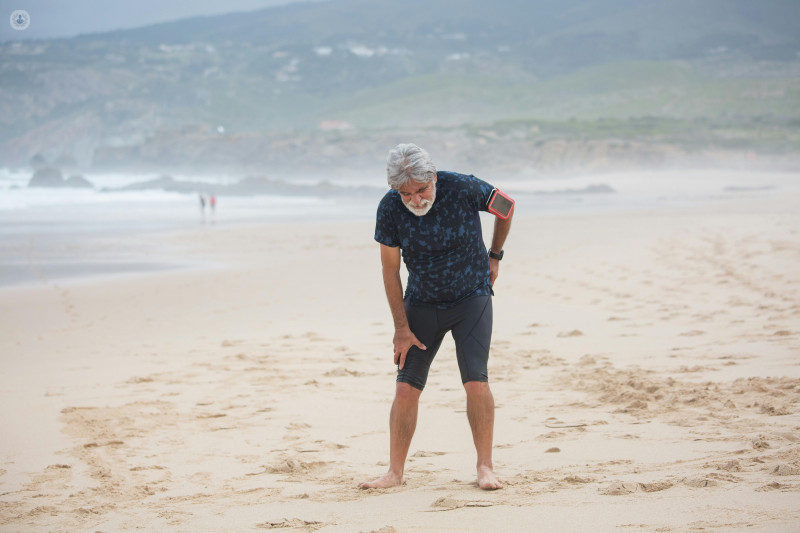Disc and back pain: A neurosurgeon's perspective
Written in association with:Disc and back pain are common conditions that can significantly impact daily activities and overall quality of life. Understanding the relationship between these conditions and neurosurgery is crucial for patients seeking effective treatment options.
Leading consultant neurosurgeon Mr Samih Hassan provides comprehensive information about disc and back pain from a neurosurgical perspective in this article.

What causes disc and back pain?
Disc and back pain can result from various factors, some of which may require neurosurgical intervention:
- Herniated or slipped discs: Discs act as cushions between the vertebrae in the spine. A herniated or slipped disc occurs when the disc's inner gel-like centre protrudes through a tear in the outer layer, irritating nearby nerves and potentially causing significant pain and neurological symptoms.
- Degenerative disc disease: Age-related wear and tear can lead to the degeneration of spinal discs, resulting in chronic pain and decreased mobility.
- Spinal stenosis: This condition involves the narrowing of the spinal canal, which can put pressure on the spinal cord and nerves, often necessitating surgical decompression.
- Spondylolisthesis: This occurs when one vertebra slips forward over the one below it, which may require surgical stabilisation if it leads to severe pain or neurological deficits.
- Spinal injuries: Traumatic events such as falls, car accidents, or sports injuries can cause disc and back pain that might require surgical intervention for optimal recovery.
What are the symptoms of disc and back pain?
Symptoms of disc and back pain can vary widely depending on the underlying cause and severity. Common symptoms include:
- Localised pain: Pain in the lower back, upper back, or neck, which can range from mild to severe.
- Radiating pain: Pain that travels down the legs (sciatica) or arms, indicating nerve involvement.
- Numbness or tingling: Sensations of numbness, tingling, or weakness in the limbs, often due to nerve compression.
- Stiffness: Reduced flexibility and difficulty moving the back or neck.
- Muscle spasms: Involuntary muscle contractions that can cause intense pain.
- Pain with movement: Increased discomfort during activities such as bending, lifting, or twisting.
How is disc and back pain diagnosed?
Diagnosing disc and back pain from a neurosurgical perspective involves several steps:
- Medical history: A thorough review of the patient's medical history, symptoms, and lifestyle factors.
- Physical examination: Assessment of range of motion, muscle strength, reflexes, and neurological function.
- Imaging tests: Advanced imaging techniques such as MRI scans, CT scans, and X-rays to visualise the spine and identify abnormalities.
- Nerve tests: Electromyography (EMG) or nerve conduction studies to evaluate nerve function and detect any damage.
What are the treatment options for disc and back pain?
Treatment options for disc and back pain vary based on the severity and underlying cause of the pain. From a neurosurgical perspective, options include:
Conservative treatments
- Rest and activity modification: Avoiding activities that exacerbate pain.
- Physical therapy: Exercises and stretches to strengthen the back muscles and improve flexibility.
- Medications: Pain relievers, anti-inflammatory drugs, and muscle relaxants.
- Heat and cold therapy: Applying heat or ice packs to the affected area.
- Minimally invasive procedures
- Epidural steroid injections: Injecting corticosteroids into the epidural space to reduce inflammation and pain.
- Nerve blocks: Administering medication around specific nerves to block pain signals.
Surgical options
- Discectomy: Removal of part of a herniated disc to relieve nerve pressure and alleviate pain.
- Laminectomy: Removal of part of the vertebra to widen the spinal canal and reduce nerve pressure.
- Spinal fusion: Fusing two or more vertebrae together to stabilise the spine and prevent further degeneration.
- Artificial disc replacement: Replacing a damaged disc with an artificial one to maintain spinal mobility.
How can disc and back pain be prevented?
Preventing disc and back pain involves adopting healthy habits and lifestyle changes:
- Exercise regularly: Engage in activities that strengthen the back muscles, improve flexibility, and maintain a healthy weight.
- Practice good posture: Maintain proper posture when sitting, standing, and lifting.
- Use proper lifting techniques: Bend at the knees and keep the back straight when lifting heavy objects.
- Avoid prolonged sitting: Take breaks to stand, stretch, and move around during long periods of sitting.
- Maintain a healthy weight: Excess weight can put additional strain on the spine.
Arrange a consultation with Mr Hassan via his Top Doctors profile.


